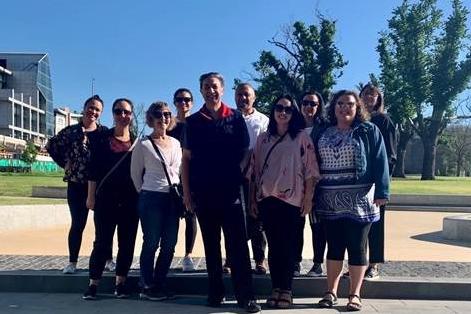Source: University of Canterbury
14 April 2022
Latest research into what makes Māori flourish has highlighted the need to change the narrative in Aotearoa New Zealand from a negative bias to one of recognising Māori success.
-
The University of Canterbury’s Professor Angus Macfarlane (foreground) with the members of Te Rū Rangahau The Māori Research Laboratory
The Mauriora Platform Research, led by Professor Angus Macfarlane of University of Canterbury (UC), asked the question: What makes Māori flourish in a world of uncertainty?
The research culminated in a framework tool to help organisations create their own cultural policies, while showcasing Māori success.
“We hear too much about Māori failings in health, wellbeing and education, so we thought it was timely to de-story and re-story. When they flourish what happens? Why did they flourish? When they do well, what does it mean to Māori, to iwi and for Aotearoa New Zealand?” says Professor Macfarlane.
The team, including UC Associate Professor Jo Fletcher, Adjunct Associate Professor Sonja Macfarlane, Dr Te Hurinui Clarke and Nathan Riki, worked in collaboration with researchers from Waikato and Victoria universities and with Māori communities.
“Collaboration and community engagement have been significant to the research. We invited people who were making significant contributions to their communities in fields like education, health and law and sought their perspectives on Māori wellbeing and Māori flourishing.”
Māori health and wellbeing are central to the research, and while recognition of hardship and inequity within Māori narratives is still an important discussion, Riki believes highlighting what success looks like for Māori is significant for future success.
“What I like most about this kaupapa is too often te ao Māori research and programmes are focussed on the negative, not on Māori flourishing, doing well and succeeding. The more we can give Māori success the mana it deserves, then we can acknowledge that it is been hard for Māori, but more so, we are able to showcase so many amazing people doing amazing things,” says Riki.
According to Professor Macfarlane, the research shows a key to Māori flourishing is when the whānau is strong and there is a genuine sense of connectedness. Participants were succeeding because of “their culture, identity, language and whakapapa, not in spite of it”.
The research proved more than a study in what makes Māori flourish, it became a practical reality within Te Rū Rangahau, the Māori Research Lab at UC and UC’s Child Wellbeing Research Institute.
“Part of our intention was to grow emerging Māori researchers. We wanted to practice what we preached so we thought, ‘We are talking about Māori flourishing, let’s do it, let’s make others amongst us flourish’,’” says Professor Macfarlane.
The team has credited Ngā Pae o te Māramatanga as playing a significant role in supporting the research through funding, expertise, goodwill and guidance along the mātauranga Māori hīkoi.
The research and findings will be presented by the UC Mauriora Platform Research team in conjunction with Ngā Pae o te Māramatanga at the Kia Puāwai online symposium.
“Through the symposium, we are opening windows of information about the research, success stories and the circumstances that helped people to succeed while acknowledging others’ research that has lifted the profile of Māori,” says Professor Macfarlane.
This is a free one-day event on 21 April 2022 from 9am until 3.15pm and will feature guest speakers including Minister of Housing, Energy and Resources, and Research, Science and Innovation Dr Megan Woods, MP for Te Tai Tonga Rino Tirikatene and New Zealand Race Relations Commissioner Meng Foon.
Register here to join the symposium.
Media contact:
- Email: media@canterbury.ac.nz Ph: (03) 369 3631 or 027 503 0168



